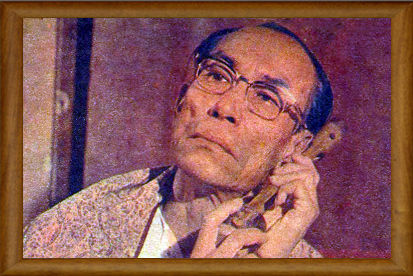Known as "Sachin Karta" to the music connoisseurs of Kolkata, "Burman Dada" as fondly called by the musicians of Bombay, "Shochin Deb Bormon" by the radio listeners of Bangladesh and West Bengal, India, "S.D. Burman" by the film cine goers or simply "SD" by his "jeans" filmi fans -- he created songs that bore the stamp of his inimitable genius, abounding in variety yet retaining the distinction of his style. Drawing from the vast store of folk music-forms and from the classical teachings, as the mood called for, he produced what is known as the Sachin Dev Burman music which is at once rotund, vibrant and unorthodox both in form and substance.
Sachin Dev Burman was born October 10, 1901 as one of the nine children of Prince Komilla of Tripura. Sachin Dev underwent classical training from his father, Sitar player and Dhrupad singer Nabadweep Chandra Dev Burman. He later trained under Ustad Badal Khan and Bhishmadev Chattopadhyay and this classical training gave him a firm rooting for the music that he was to compose later in life.After his father's death Sachin left home, travelled for years in the forests of Assam and Tripura from where he gained his formidable knowledge and rich repertoire of the rich folk of that region and Bengal. Later he became a disciple of Ustad Aftabuddin Khan, becoming an ace flautist, and starting his own music school, ‘Sur Mandir’ in Calcutta in the 1930’s. He rose to be a popular singer there, learnt more under the illustrious K. C. Dey. He also scored music for Rajkumar Nirshoney, a Bengali film, in 1940. He married Meera, an accomplished singer in 1938. Rahul Dev Burman was born a year later.
Dada left for Bombay against his will in 1944 at the request of Sasadhar Mukherjee of Filmistan, to do two films, Shikari and Aath Din. But Bombay was no cake walk. Despite the musical success of Shikari and Aath Din and later on Do Bhai, Vidya, Shabnam, Dada was still not considered a force. Frustrated, Burman decided to pack up for Kolkata. It was at this point Ashok Kumar put his foot down. "Compose the music for Mashaal and then you are free". Dada took up the baton again. Mashaal was a super hit. The song " Upar Gagan Vishal", became a rage. It also launched Manna Dey in a new fold. After that it was just a matter of time before Dev Anand, who had struck a rapport with this kindred progressive soul, launched his own banner Navketan, and signed S. D. Burman for Baazi. This 1951 hit, along with Jaal (1952) and his AVM hits Bahar and Ladki clinched Dada’s success story, and his career never flagged till 1974 when he quit signing films from ill – health. Dada Burman has the highest average of hit songs among any composer in Hindi films. Obviously, such success stemmed from his unshakeable belief in himself, and he was known to refuse films where the filmmaker wanted ‘hit’ songs. “I compose only good songs”, he would tell this brigade. S. D. Burman won only a few awards – because he never cultivated them but his greatest triumph lay in the fact that his choosiness made every score count. There was a time in Bombay when the lyrics were set to tune by the music directors. Dada changed the theory. The tune first, the lyrics later. Today nine out of ten songs are composed in this manner. Also for every song sequence Dada had many alternative tunes thus giving the producers a wide choice. Dada would often compose a tune instantly, and his music had a strong foundation of folk and classical and was known to innovate by mixing them with Western arrangements. He was averse to commercialization, but he would also aver that a tune should be so simple that 'even my servant should be able to sing it'. When necessary, he would compose exquisite classical numbers, but he would always say that film music was not the medium to show off one’s classical prowess.
He would scoff at the so–called indispensability of a singer. When Lata Mangeshkar refused to record with him, he delivered hit after hit with Asha Bhosle and Geeta Dutt and only made with her because his son Pancham wanted her to sing his career first song. He groomed singers like Asha Bhosle, Kishore Kumar and even Hemant Kumar and made Rafi sing in a soft, crooning fashion when others wanted high pitched or maudlin vocals from him. Dada Burman would practice consciously forgetting a song that he had recorded so that it would not subconsciously permeate in a later composition. His firm base and his selective nature kept his music fresh and no song of his ever gave a déjà vu feeling of an older song. Dada received the prestigious Sangeet Natak Academy Award and the Padmashree for his contribution to music. He got a
National Award for singing in 1969 for 'Kahe Ko Roye Hoye Jo Hoye..' (Aradhana). Earlier in 1934 in Kolkata, Dada was awarded a gold medal in All Bengal Classical Music Conference in which Ustad Fayyaz Khan, Ustad Allauddin Khan, Bishwadev Chatterjee participated. In Agartala, a bridge has been dedicated in his memory. S. D. Burman awards are given from Agartala every year to upcoming artists. And in Bombay Sur Singar Samsad Academy presents S. D. Burman awards to musicians involved in films.
Dada left for heavenly abode on October 31, 1975 after a paralytic stroke felled him a year earlier. There was a time when the royal family of Tripura criticized him for making a living out of music as it brought down the image of royalty. Dada was hurt and slowly he snapped his ties with Tripura. Today, the Tripura royal family is known for Sachin Dev Burman !!

